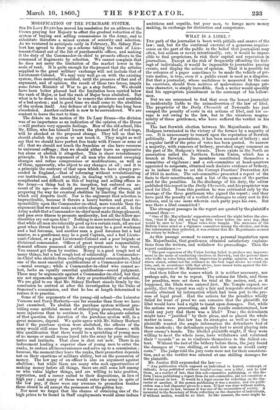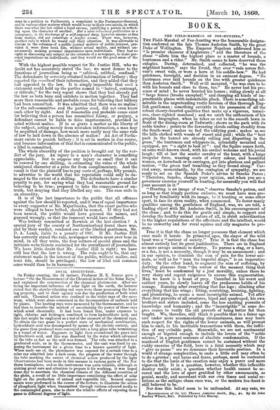WHAT IS A LIBEL ?
THE path of the journalist is beset with pitfalls and snares of the law; and, but for the continual exercise of a generous acquies- cence on the part of the public in the belief that journalists may often, but seldom or never intentionally, err, it would be impos- sible to find proprietors, to risk their capital and reputation in journalism. Except at the risk of frequently offending the feel- MO of individuals, it would be impossible to journalize passing events, and display the action of opinion. That it is possible for the columns of a paper sometimes to be made the vehicle of pri- vate malice, is true, even if a public event is used as a disguise. But that a journalist, whose usefulness is measured by the care he exercises, should from motives of malevolence damage pri- vate character, is simply incredible. Such a writer would speedily find his appropriate punishment in the contempt of his fellow- men.
But we are concerned to find that even the honest journalist is incidentally liable to the animadversion of the law of libel. The proprietor of the Daily Chronicle of Newcastle has just escaped the penalty of costs in six actions of libel, and his es- cape is not owing to the law, but to the vicarious magna- nimity of three gentlemen, who have suffered the verdict in his stead.
The last Berwick election between Mr. Majoribanks and Mr. Hodgson terminated in the victory of the former by a majority of one. It is unnecessary to remark upon the reputation of Berwick politically. For generations, it has been accused of bribery ; and a regular tariff of the price of votes has been quoted. So narrow a majority, with rumours of bribery, provoked angry comment on the part of Mr. Hodgson's friends. There exists in the North an association called the Northern Reform Union, which has a branch at Berwick. Its members constituted themselves a committee of vigilance ; and a sub-committee at head-quarters appointed to cooperate, obtained such decisive evidence of bribery, as to induce them to set the Corrupt Practices' Prevention Act of 1854 in motion. The sub-committee presented a report of the facts to their constituents, and a list of the names of the parties sued for the penalties. In the discharge of his duty, the editor published this report in the Daily Chronicle, and his proprietor was sued for libel. From this position he was extricated only by the courage of the three gentlemen who signed the report ; and they have paid the penalty of a verdict of damages to carry cost in five actions, and in one more wherein each party pays his own. But was there a libel committed?
The strongest passages in the report are quoted by the plaintiff s counsel thus :-
" One of Mr. Majoribanks' supporters confessed the night before the elec- tion, that if they did not buy up fifty votes before the next day, they would be sure to lose.' These votes were bought. The members of the Reform Union acted as a vigilance committee during the election, and from the information they collected, it was evident that Mr. Majoribanks secured his return by bribery."
As this passage seemed to convey a personal imputation upon Mr. Majoribanks, that gentleman obtained satisfactory explana- tions from the writers, and withdrew his proceedings. Then the report continues :-
' The past exposures of the Union having failed to produce any improve- ment in the mode of conducting elections in Berwick, and the persons there who traffic in votes being utterly impervious to public opinion, we have, as above stated, submitted the evidence to the best legal advice we could ob- tain, and, in accordance with that advice, have issued writs against the fol- lowing supporters of Mr. Majoribanks."
And then follow the names which it is neither necessary, nor perhaps safe, for us to repeat. The actions for libels, and those for penalties, were set down for trial at the assizes, and, as it happened, the libels were entered first. Mr. Temple argued, co- gently, that the report was only a fair and temperate statement of results obtained by information which had been put to the pro- cess of legal proof. Had the actions for the penalties wholly failed for want of proof we can conceive that the plaintiffs for libel would have had a right to insist upon damages. But, while the actions were proceeding, and the results undetermined, how could any jury find there was a libel? True ; the defendants might have " justified" by their pleas, and so placed the whole matter in issue. But law has its strategies as well as war ; the plaintiffs wanted the ample information the defendants had of these misdeeds ; the defendants equally had to avoid playing into their enemy's hands. The libelled plaintiffs might, if they were willing to meet the whole issue, have withdrawn and reentered their " records " so as to vindicate themselves to the fullest ex- tent. Without the fact of the bribery before them, the jury found the damages at " one shilling, or such low sum as would carry costs." The judge told the jury costs were not for their considera- tion, and so the verdict was entered. at one shilling damages for the plaintiffs.
Mr. Justice Hill expounded the law:— "Any publication which exposed an individual to hatred, contempt, or ridicule, being published without lawful excuse, -teas a libel; and he told them, as a matter of law, that this sub-committee publishing, or this Re-
form Union publishing a report from its sub-committee, did not constitute a lawful excuse in law. It would be a legal excuse for reflecting on the cha- racter of another, if the person publishing it was a master, and the publi-
cation was a bad character given to a man. If that was done without malice, it was an excuse in law, because it was one of the necesssities of society. A.
memorial to the Secretary of State reflecting on the character of individuals, if without malice, would be no libel. In like manner, the same might be done in a petition to Parliament, a complaint to the Postmaster-General, and in various other matters which would occur to their own minds, in which
there was what the law called a legal excuse, justifying a person in reflect- ing upon the character of another. But a mere voluntary publication in a newspaper, in the discharge of a self-imposed duty, however sincere or free from malice, did not constitute a lawful excuse. There was, however, another rule to which he would call their attention. It was allowable to discuss in the columns of a public journal matters of public interest, pro- vided it were done bona. fide, without actual malice, and without un- necessarily making personal imputations upon individuals. They had no right in discussing any subject in the columns of a newspaper, to make per- sonal imputations on individuals, and they would see the good sense of the rule."
With the highest possible respect for Mr. Justice Hill, who we doubt not has accurately stated the law, we must demur to the functions of journalism being so " cabined, cribbed, confined." The defendants by notoriety obtained information of bribery ; they reported the results of their information, and they added that they had appealed to the law. It is simply impossible that suck a statement could hold up the parties named to "hatred, contempt, or ridicule," for the very report shows that they had already put the law as both bane and antidote in motion together. They had more than reasonable and probable cause for believing that bribery had been committed. It was admitted that there was no malice ; for the sub-committee and the parties sued, did not even know each other by sight. And if reasonable and probable cause exist for believing that a person has committed felony, or perjury, a defendant cannot be liable to false imprisonment, provided he acted without malice. If in so grave a matter as the liberty of the subject, acting merely from mistaken information, a man may be acquitted of damage, how much more easily may the same rule of law be laid down in the absence of malice An Act of Parlia- ment exists to punish bribery ; it is set in motion in due course, and because information of that fact is communicated to the public, a libel is committed.
The whole absurdity of the position is brought out by the ver- dict of the jury. An injury to a man's character is something appreciable. But to suppose any injury so small that it can be covered by one shilling, is estimating the value of the whole uninjured character at a price far from complimentary. And the result is that the plaintiff has to pay costs of, perhaps, fifty pounds, to advertise to the world that his reputation could only be da- maged to the extent of a shilling. The defendants have a similar penalty to pay, for saying what they had reasonable ground for believing to be true ; prepared to take the consequences of un- truth, but denying that they libelled any one. The case ends in an absurdity. It is of the last importance to the public that all offences against the law should be reported, and it was of equal importance to every supporter of Mr. Majoribanks, that the exact parties who were alleged to have bribed, should be named. If they had not been named, the public would have guessed the names, and guessed wrongly, so that the innocent would have suffered.
Was bribery committed at Berwick at the last election ? A special jury of the county of Northumberland found there was, and by their -verdict, rendered one of the libelled gentlemen, Mr. D. A. Lamb, liable to a penalty of 1001. If Mr. Justice Hill has correctly stated the rule, newspaper writers must ever bear in mind, in all they write, the four corners of special pleas and the intricate webs therein contained for the punishment of journalists. We have little doubt that Mr. Justice Hill is right ; we have still less that the law is wrong. The rule ought to be, that any statement made in the interest of the public, without malice, and bona fide, should be privileged; the law of libel and common sense would then be in harmony.



























 Previous page
Previous page